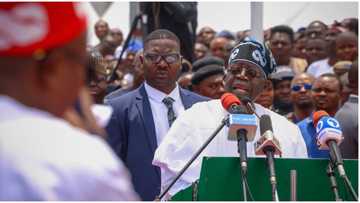Five business takeaways from Nigeria's first founder to own a $1billion startup
- Aboyeji said he's not a techie as popularly believed, stating that he leveraged on another skillset to establish and grow Flutterwave and Andela
- The Flutterwave founder said the global tech industry belittle Nigerian founders even after Jumia and Interswitch success
- Aboyeji mentioned four things founders must consider to make their business investment-worthy in investors' eyes
PAY ATTENTION: Click “See First” under the “Following” tab to see Legit.ng News on your Facebook News Feed!
Pay attention: Join a community of CEOs, founders and decision-makers: subscribe for a free monthly business newsletter Digital Talks and succeed BIG!
The future of Nigeria is changing gradually, and one of those behind the redecoration is Flutterwave co-founder, Iyinoluwa Aboyeji. Ten years ago, Aboyeji was just a 19-year-old guy trying to find his bearing in Nigeria's edutech space.
At that time, the edutech space was largely unattractive, but still, "E" as he is popularly called, founded Bookneto, an online educational tool. He was passionate about offering the solution to students' educational problems, but there was Myschool.ng, the go-to for many Nigerian students.

Read also
Davido performs at Gov Otti of Abia's inauguration, video goes viral: "My idolo is very hardworking"
Ten years later, Myschool.ng continues to own the space, while Bookneto website is now unavailable. That setback didn't deter Aboyeji, and in his quest to continue providing internet-driven initiative, he co-founded Flutterwave and Andela, and that was the beginning of his success story.
Today, Flutterwave is more valuable than Myschool.ng, and it's one of four startups that have crossed the $1 billion mark in Africa. On Thursday, Aboyeji joined Legit.ng's Digital Talks to discuss his growth in the tech space and how he successfully established a one-billion-dollar business.
PAY ATTENTION: Сheck out news that is picked exactly for YOU ➡️ find the “Recommended for you” block on the home page and enjoy!
During the interview, Legit.ng grabbed five takeaways from his wealth of experience:
First Takeaway: You don't have to be an expert in a business to run it successfully
For Aboyeji, Tech wasn't his first love, neither did he put in for a course to become a tech guru, as he wanted to become a lawyer and politician. A reason why he studied Legal Studies and Economics at the University of Waterloo, in Canada, where entrepreneurship, especially tech was encouraged.

Source: UGC
While he couldn't provide tech solutions, he was the solution to techies operational problem - he was the business guy, leveraging on his business strategy skillset, he explained:
"What I got really good at was being the business guy to the tech guys. Helping the tech guys figure out operationally, from a business point of view, how do we actually take this thing from zero to one. And that's the skillset I have leveraged all this while, that's why people are very surprised when they hear I'm not actually a tech guy."
Without being a tech guy, Aboyeji established Flutterwave, and today, Flutterwave is the most valued payment platform out of Africa within five years of operation. His core strength is handling the operations, while the techies sort out the innovations.
PAY ATTENTION: Click “See First” under the “Following” tab to see Legit.ng News on your Facebook News Feed!
Second takeaway: Being a Nigerian or African won't stop a great product
There has been a stereotype about the operational abilities of Nigerians in growing a successful tech company. Foreigners have been given the credit for tech companies in Nigeria that grew into a $1 billion firm - from Jumia to Interswitch.
But with Flutterwave hitting that mark and joining the unicorn league, the company has now proven that a tech startup established by Nigerians has the ability to become a one-billion-dollar company without assistance from foreigners.
"Jumia, they said it was German, even though Nigerians built it. For Interswitch, they say banks started it, and PE was involved, but this one (Flutterwave), we started it from a tiny office in Lekki, we grew it here in Nigeria in five years.

Read also
Finance, healthcare for veterans: 5 Things entertainment industry stands to benefit from Tinubu's presidency
"So this isn't an Interswitch that had a 20-year kinda journey. And it's (Flutterwave) a Nigerian team, African team, so there are no excuses. So I want to hear the feedback from those people (critic of Nigerian tech startups), so we work on the next one."
Third takeaway: Nigeria is the frontier for investment now
For foreign investors, Nigeria offers so many opportunities considering the enormous problem that needs solving, and this is channelling foreign capital into Africa's largest economy.
PAY ATTENTION: Subscribe to Digital Talk newsletter to receive must-know business stories and succeed BIG!
This is noticeable in the recently raised funds by Flutterwave, Aboyeji told Digital Talks. The payment platform went from raising $35 million in January 2020 to sealing boardroom deals worth $170 million in March, a year later, despite the remnants of COVID-19 still lingering, affecting deal transactions.
This shows a high belief system of investors in the Nigerian market regardless of the hostility in the business environment. Even local investors who were sceptical of Nigeria's tech space are now tilting towards the innovators.
According to the co-founder of Andela, this is because a lot of people have seen the light:
"A lot of things they thought were previously impossible are now possible. And there's a lot of money from the Flutterwave transaction that will flow back into the ecosystem, that will encourage other people to take the plunge, and encourage other people to make money."

Source: Original
Fourth takeaway: Challenges remain because no one wants to solve them
For a startup that grew into a one-billion-dollar firm within five years, you did think Flutterwave faced no challenge - you are wrong. One of the challenges the payment company faced was from a little-known policy of the Nigerian government that had been around since 1993.
PAY ATTENTION: Do you have news to share? Contact Legit.ng instantly
The policy prevented banks from investing in venture capital for about 28 years. This was against global practice, as international banks have been funding foreign private equity firms for years.
Because most Nigerian startups depended mostly on foreign private equity firms and incubators, no one bothered to challenge the status quo until Aboyeji, as an entrepreneur that he is, decided to take the risk with few industry players last year.
"There were previous policy challenges that I will say prevented people from getting involved (investors offering capital to tech startups). It wasn't that those challenges weren't obvious, there was just no need for anybody to solve that problem.
"Last year, we took a big step, I and few other people in the ecosystem went to the national assembly and had a very productive conversation with Senator Ubah. He pushed forward an amendment to the banking and other financial institutions act that allows banks to invest up to 20% of their asset in venture capital."
Why that has been solved, Aboyeji said they are still working with the government on regulatory flexibility and ensure financial control is loosen, in order to allow companies to be domiciled in Nigeria without fear.

Read also
May 29 handover: How banditry, CBN Naira redesign policy, Twitter ban, medical trips tainted Buhari’s legacies
Fifth takeaway: How to be an investment-worthy company
PAY ATTENTION: Get the Latest Nigerian News Anywhere 24/7. Spend less on the Internet!
For Aboyeji, positioning your business for investment comes with three factors, talent, data, design, and distribution. He said no matter how attractive the product looks, if the person heading the startup isn't passionate about the business, it will be a turn-off, as talent is everything.
With data, he said investors will be exposed to the market opportunity that seems unobvious to people. According to Aboyeji, data reveals the kind of solution being offered to solve a problem.
And for Design, the product should be done to work for the users, not the founder. The solution should be tailored to the needs of the users, and not what the founder thinks will be good for the market.
For distribution, he said the ways such a product could get in the hands of users matter. This means there might be a need to partner with third parties that will ease the distribution of the product and get it closer to the users. Like Flutterwave, the payment company had to partner with banks and telecoms.

Read also
"Smart & intelligent": Reactions trail new video of another Nigerian man's interview on UK TV about japa
In summary, "E" said:
"So that combination of talent, data, design and distribution is what I look at when we thinking about how do we identify companies. But overall, is it a real problem to people, can we turn this problem into a global business opportunity."
Meanwhile, Legit.ng had reported that Aboyeji said Nigeria's GDP can become a trillion-dollar economy if the potential of the country is fully harnessed.
According to the entrepreneur, there are several problems in Nigeria that can be turned into business opportunities that will in turn, grow the country's economy.
Fakoyejo Olalekan is a Business and Financial Journalist with over three years of experience in covering finance and business activities within Nigeria and offshore. Prior to joining Legit.ng, he worked at Nairametrics where he wrote financial and investment analysis articles. Olalekan is a resourceful and result-driven journalist with a track record for conducting extensive research and interviews to produce articles that provide different perspectives to market activities.
Source: Legit.ng






